Celerity
Celerity's JournalThe Coming Freak-out Over the California Primary
https://nymag.com/intelligencer/2020/02/millions-of-california-indies-banned-from-democratic-primary.htmlIf you thought the brouhaha over Iowa’s delayed vote count was the last complaint you’d hear during the nominating season, get ready for another in California on March 3. No, I’m not talking about the likelihood of a very slow count in the Golden State (more about that later), but about the increasingly loud complaints from the Bernie Sanders camp about the difficulties independent voters face in participating in this primary, as Politico reported recently:
Presidential candidate Bernie Sanders charged Friday that California’s primary system threatens to disenfranchise millions of independent voters whose support he has cultivated in the nation’s most populous state. Sanders said Friday during a press conference in Santa Ana that he and his team have been campaigning hard to reach California’s 5.3 million “no-party-preference” voters, who now represent the second largest voting bloc in the state at 25.9 percent — ahead of Republicans, who comprise 23.7 percent …
“Unfortunately, under the current NPP participation rules, we risk locking out millions of young people … millions of young people of color — and many, many other people who wanted to participate in the Democratic primary but may find it impossible for them to do so,” he said. “And that seems to me to be very, very wrong.”
The root of the problem here is that party preferences in California have become relatively insignificant thanks to the establishment via a 2010 ballot initiative of a nonpartisan top-two primary system in which everyone in the state gets the same ballot for sub-presidential contests that includes all the candidates competing regardless of party, with the top two vote winners proceeding to the general election. But voters are still asked to designate a party preference when registering, which makes those registration rolls a hot property for campaigns and other purchasers, and also guides the one partisan primary still remaining: the quadrennial presidential primaries.
snip
Steve Bullock, Get Over Yourself And Run For The Damn Senate!
https://www.wonkette.com/steve-bullock-please-get-over-yourself-run-for-senate-right-nowSenate Minority Leader Chuck Schumer is desperate to flip the Senate. Unfortunately, he's had trouble convincing Democrats in some key states to join this noble cause. Stacey Abrams wasn't interested in challenging David Perdue in Georgia, despite having equal favorability. Beto O'Rourke has declined to run against John Cornyn in Texas. But Schumer still hopes Montana Governor Steve Bullock will come to his senses and help save the nation. Bullock, a former presidential candidate, has insisted that the Senate isn't for him. Still, the filing deadline is two weeks away. Maybe Bullock will do the right thing like a common John Hickenlooper.
Schumer met with Bullock in Montana last weekend. We don't know the extent of Schumer's begging or whether it had any effect on Bullock, who we assume doesn't enjoy seeing grown men cry. You'd think convincing people to run for Senate would be the easiest part of Schumer's job, but it's like he's out there selling vacuum cleaners. The Democrats who've turned their noses up at the Senate claim that it's just not a place you go if you're interested in accomplishing anything useful. O'Rourke even called out Schumer by name when he was running for president, and that name was feckless Chuck.
BETO: Ask Chuck Schumer what he's been able to get done ... We still don't have [universal] background checks. Didn't have them when he was in the majority, either. So, you know, the game that he's played, the politics that he's pursued have given us absolutely nothing and have produced a situation where we lose nearly 40,000 of our fellow Americans every year..
https://twitter.com/politico/status/1232459022181126145
Stacey Abrams has repeatedly stated that "her natural tendencies are executive, not legislative," and she's currently doing the good work in Georgia. Abrams's group, Fair Fight Action, is dedicated to making sure everyone can vote regardless of whether they might support Democrats. She doesn't agree that she'd serve the public better in the Senate.
snip
Scotland Set to Be First Country to Provide Free Pads and Tampons
Its Parliament approved a bill that would make Scotland the first country to end “period poverty.”https://www.nytimes.com/2020/02/27/world/europe/scotland-pads-tampons.html
LONDON — Scotland is poised to become the first country to end “period poverty” by providing free sanitary products to women of all ages in the country. Free menstrual products are already available to students in high schools, colleges and universities in Scotland. And a bill passed by the Scottish Parliament on Tuesday will make pads and tampons free across the board.
Monica Lennon, the lawmaker who submitted the draft proposal of the bill, said she was thrilled that it had attracted support across Scotland, including from civic groups and “individuals who have had their own lived experience of period poverty and know what it is like not to have access to products when they need them.” Although the bill passed with 112 votes in favor, none against and one abstention, some lawmakers warned that the legislation faces a few hurdles before becoming law, though they were regarded as surmountable. One of those is a yearly cost that the government puts at about $31 million.
Tampons are taxed at 5 percent in Britain — a levy that the British government has been unable to abolish because of European Union rules that class sanitary products as “luxury” products. The bloc has pledged to remove all taxes on menstruation products by 2022.
About 62 million pounds, or $80 million, collected in taxes on sales of sanitary products in Britain has been diverted to women’s charities since 2015, the minister for civil society, Mims Davies, said last year. Nearly 10 percent of girls in Britain have been unable to afford period products, and 19 percent have resorted to using substitutes like rags, newspapers and toilet paper because of the high cost, according to research by a girls rights charity, Plan International UK.
snip
NYT : The Superdelegates Are Nervous
And many of them tell us they’re willing to use a brokered convention to stop Bernie Sanders.https://www.nytimes.com/2020/02/27/us/politics/on-politics-sanders-superdelegates.html
This week, I took a brief break from chasing candidates across the country to conduct a little stress test on the Democratic Party establishment. Over the past few days, my colleague Reid Epstein and I interviewed 93(!) superdelegates — the elected officials, Democratic National Committee members and other party leaders who could play a role in choosing a nominee at the national convention. Most of them have spent years, or even decades, working to elect Democrats to all levels of government.
After nearly 100 interviews, I can confidently report back to you, dear readers, that in some quarters of the Democratic Party, the anxiety about Senator Bernie Sanders’s popular vote victories in the first three nominating contests is real — and rising. We are talking palm-sweating, meditation-app-subscribing, yoga-retreat-scheduling levels of anxiety.
One prominent Democrat put the “freakout level” at a 12 — on a scale of one to 10. In private conversations, members of Congress used words like “disaster” and said Mr. Sanders had “hijacked the party.” One lawmaker described the mind-set as “depression mode.” (Many of these people threw in some expletives, too.)
Much of these Democrats’ concern is rooted in fears that having Mr. Sanders at the top of the ticket could cost Democrats seats in competitive House and Senate races, particularly in states like Arizona and Ohio, where some fear his liberal platform could alienate the more moderate suburban voters who helped Democrats win back the House in 2018. “Bernie Sanders most certainly is not our strongest candidate,” said Will Cheek, a D.N.C. member from Tennessee. “I intend to firmly and resolutely fight for the strongest candidate.”
snip
The Economist : Countries that have benefited most from globalisation are the most fearful of change

People in slower-growing rich countries are most at ease with it
https://www.economist.com/graphic-detail/2020/02/27/countries-that-have-benefited-most-from-globalisation-are-the-most-fearful-of-change

THE PAST decade has been an uncomfortable one for economic liberals. The global financial crisis of 2007-09, and the Great Recession that followed, caused many to question the merits of trade and immigration. Such doubts have given rise to a wave of populist movements across the West, many of which cut across the traditional left-right political divide. In 2016, shortly before Donald Trump was elected America’s 45th president, this newspaper observed that the world appeared to be separating into two distinct groups of people: those who are “open” to change and those who are not. Drawbridge down, or up?
A sweeping new survey by Ipsos MORI, a pollster, sheds some light on precisely where support for pulling up the drawbridge is strongest. In August 2019 Ipsos asked 22,000 adults across 33 countries (a representative sample covering some two-thirds of the world’s population) more than 300 questions about their attitudes towards the world, their country, their community and their own lives. The results suggest that on average, people view globalisation more favourably than they did in the depths of the financial crisis. In the 20 countries surveyed by Ipsos over the past six years, 56% of respondents, on average, think that globalisation is good for their country, up from 49% in 2013.

Yet discontent with globalisation is still common in rich and poor countries alike. Curiously, the very places that have gained most from globalisation in recent years, measured by economic growth, are also among the most sceptical about the changes it brings. Fully 85% of respondents in four of the large emerging countries surveyed—Brazil, China, India and Turkey—thought that the world was changing too quickly. A similar share agreed that people in their country lived happier lives in the past.
To test this further, The Economist constructed an index using eight of Ipsos’s questions about openness to societal change and progress*. For this, we employed principal component analysis (PCA), a statistical technique for simplifying data sets, in order to compress eight variables of interest into just one element. The resulting “drawbridge” index captures nearly 50% of the variation across our eight questions concerning attitudes to openness. We find that for the 34 countries surveyed by Ipsos, the correlation between growth in GDP per person between 2008 and 2018 and our drawbridge index is 60%. In other words, countries that have grown faster over the past decade tend to be more resistant to change. This may seem puzzling. Economic growth has the power to pull millions out of poverty. But it can also be disruptive. This may be particularly true in emerging countries. Liberals may have further uncomfortable years ahead.
snip
The Economist : What does Bernie Sanders's political revolution hope to accomplish?

The senator for Vermont is a European social democrat—of a 1970s vintage
https://www.economist.com/united-states/2020/02/29/what-does-bernie-sanderss-political-revolution-hope-to-accomplish

Ambitious, exhilarated and a little nervous, a freshly elected Democratic congressman was buzzing with the possibilities of his new office when he first encountered Bernie Sanders. “You do realise this place is a complete waste of time, don’t you?” growled the independent senator from Vermont, by way of welcome to Capitol Hill. And, to be fair to Mr Sanders—and to the millions of Americans who set such great store by his integrity and plain speaking—he could not have summed up his own legislative history better. Mr Sanders has grumbled persistently about real problems—a broken health-care system and inequitable college education above all—while rarely making any headway in fixing them. During 30 years in Congress he has been primary sponsor of just seven bills that became law, two of which concerned the renaming of post offices in Vermont. An uncharitable observer might consider this the record of a blowhard.
Mr Sanders has taken his preference for speechifying to the big time. With only momentary interruptions, he has spent five years campaigning to be president—ever since he decided to play spoiler to Hillary Clinton’s coronation. America’s most famous socialist is running for the presidency on more or less the same set of problems he has emphasised for all those many years (plus a more recent focus on climate change). Though his proffered solutions, in the form of fantastical reforms and vast spending pledges, look ruinously expensive and unlikely to pass Congress, a committed faction of Democratic voters like them enough to have made Mr Sanders the indisputable front-runner. A candidate could scarcely have hoped for better results in the all-important early-primary states. Betting markets give him a 60% chance of winning the nomination. If he does well on March 3rd, Super Tuesday, when 14 states vote and one-third of delegates will be allocated, he will be uncatchable.
That worries many Democrats. Mr Sanders is a 78-year-old self-described socialist pulling his party hard to the left in an election in which the centre is wide open. Among those who feel the Bern, Mr Sanders’s ideological consistency over his three decades in Washington is usually the first thing they mention. Jeremy Corbyn’s supporters had similar feelings about their candidate, before he led the Labour Party off a cliff in Britain’s most recent general election. In some ways, Mr Sanders’s proposals are more radical than Mr Corbyn’s were. If he got his way, all American residents, including undocumented immigrants, would receive free health care, child care and education at state universities. Workers would have a jobs guarantee, seats on corporate boards and receive 20% of the equity of large firms. Billionaire clout would be broken by a wealth tax.
There are two hurdles to achieving all this: a general-election contest against Mr Trump, and gaining control of Congress.
Like a Goliath company swallowing start-ups to preserve its dominance, Mr Sanders has embraced all the new progressive-sounding ideas that have recently emerged—borrowing heavily from the innovations of Elizabeth Warren in America and Mr Corbyn in Britain. From Ms Warren, he has taken on the idea of a wealth tax—though with higher rates set at 8% at the top—co-determination of corporate boards, and the creation of federal charters for big corporations. From Mr Corbyn, he has borrowed the idea of national rent control and the forcible expropriation of corporate wealth to workers (though he has doubled Mr Corbyn’s suggested 10%, to 20%). The Green New Deal, proposed by climate activists and espoused by Alexandria Ocasio-Cortez, a first-term representative, has found a welcome home in his agenda.
snip
much more at the link

Bernie dropping like a rock on 538's overall primary forecast
1591 pledged delegates is a big key number
1591 or less for a total and Bernie is under 40%, which is a big psychological barrier if there is no one at 1990 and thus a first ballot winner.
If he rolls into the convention with only, say 39% of the delegates, and Biden is at say 35% (I am NOT saying these will be the totals at all) of the delegates, he will have a FAR harder time making a case than if he was at say, 45% and Biden at 29% At that point, a 45%-29% breakdown in Sanders' favour, it would be basically impossible to deny him the nomination, as the party would tear itself apart and we would lose to Trump even more likely than nominating Sanders would do.
https://projects.fivethirtyeight.com/2020-primary-forecast/
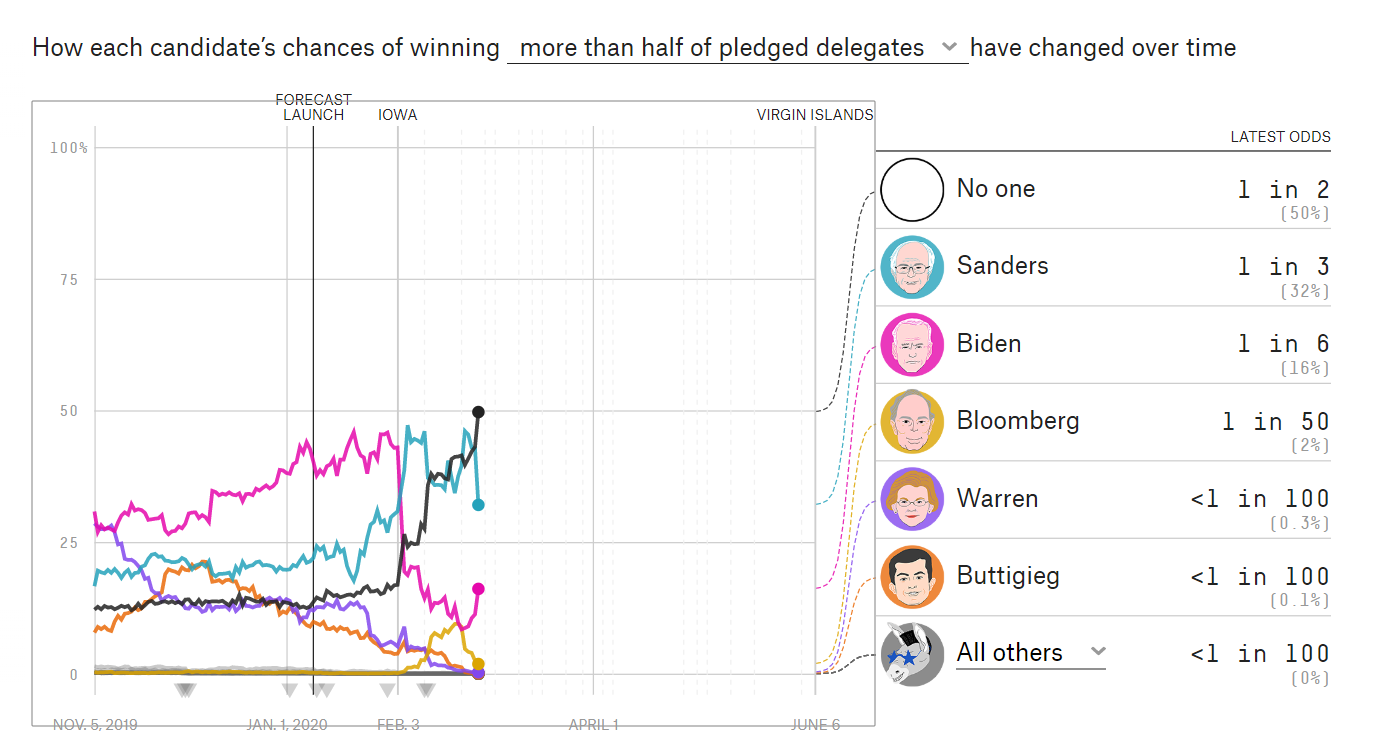
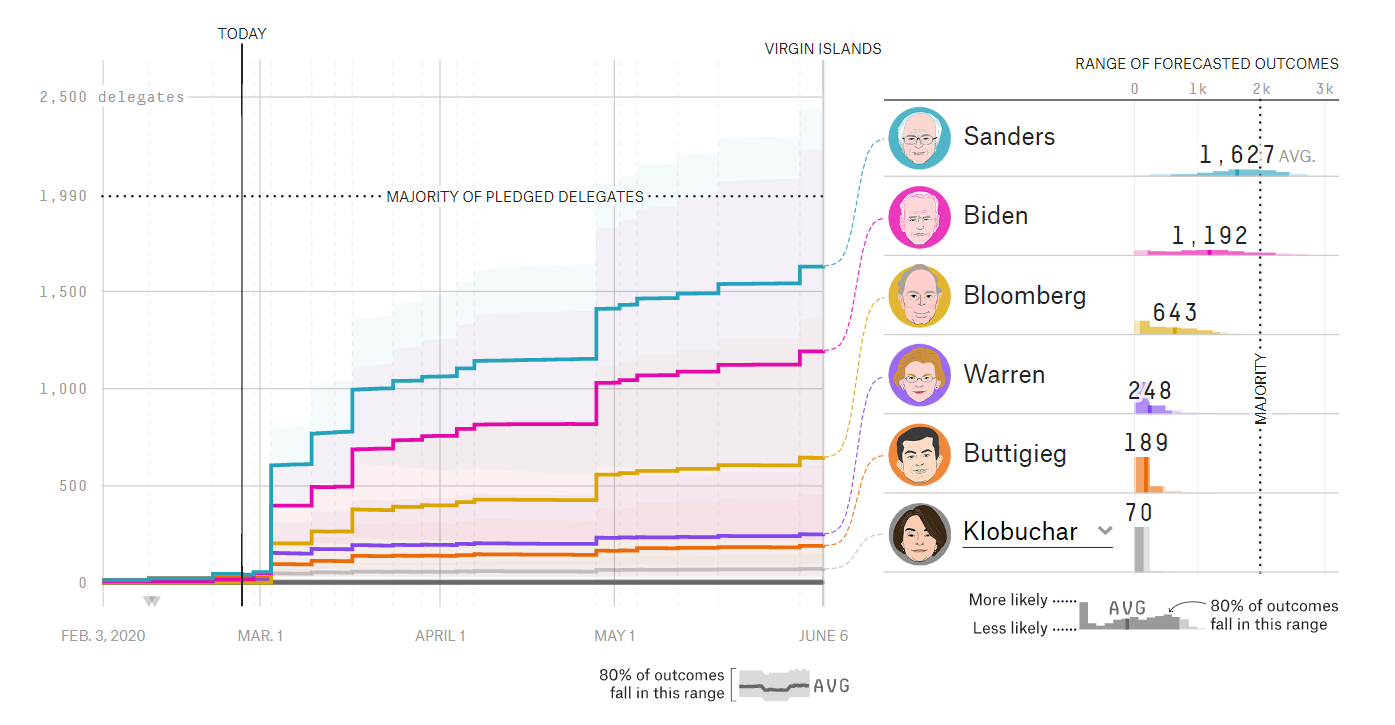
New SC post debate poll Biden 40%, Steyer 12, Sanders 11, Pete 9, Warren 9, Klobuchar 6
B/C rated

Survey Methodology Included:
57%-Women
61%-African American
32%-65 or older
Data Stratified by Geography
** 11% attended a campaign event
** 38% personally met a candidate or campaign volunteer
Andy Shain
@AndyShain
New #SC2020 poll from SC-based political firm Starboard Communications (1,102 likely Dem primary voters; Feb 26; MoE +/- 2.82%)
Biden - 40%
Steyer - 12%
Sanders - 11%
Warren - 9%
Buttigieg - 9%
Klobuchar - 6%
Gabbard - 2%
Undecided - 12%
(54% watched the #DemDebate in Charleston)
https://twitter.com/walter_whetsell/status/1233097062193025026
https://projects.fivethirtyeight.com/polls/20200227_SC.pdf
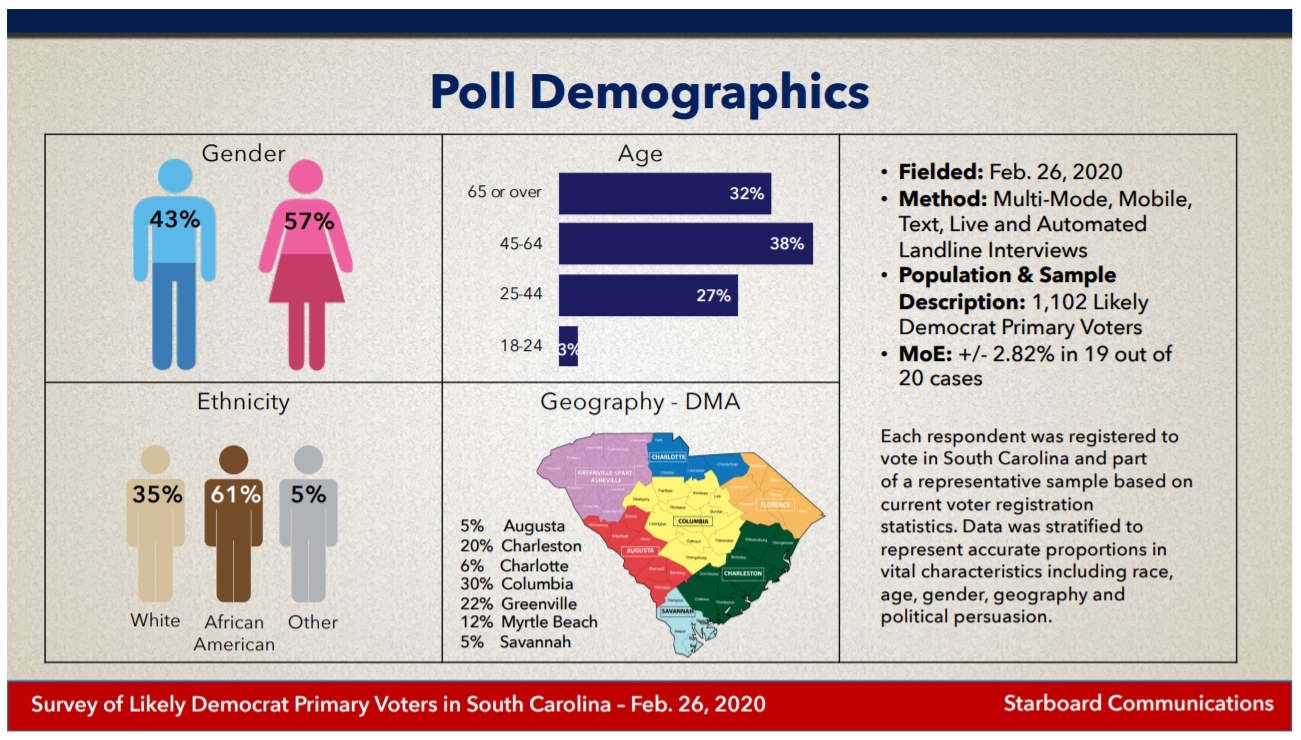
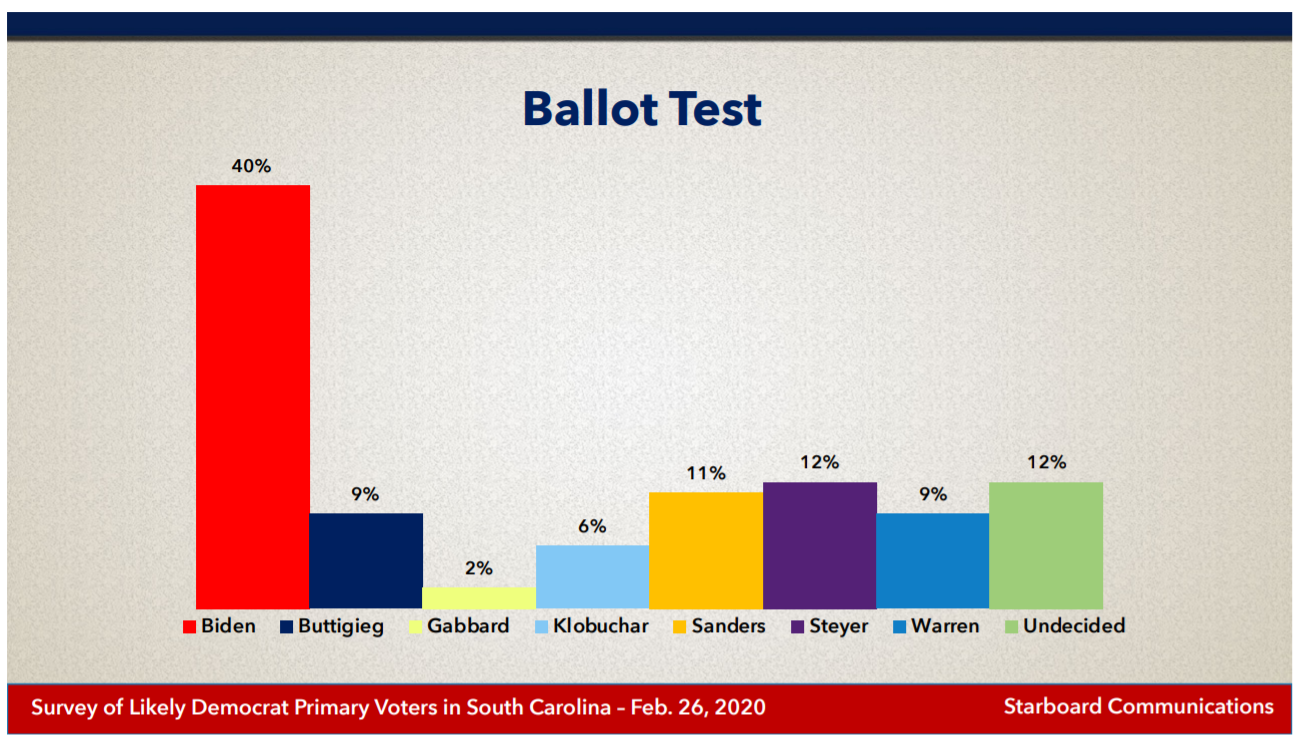
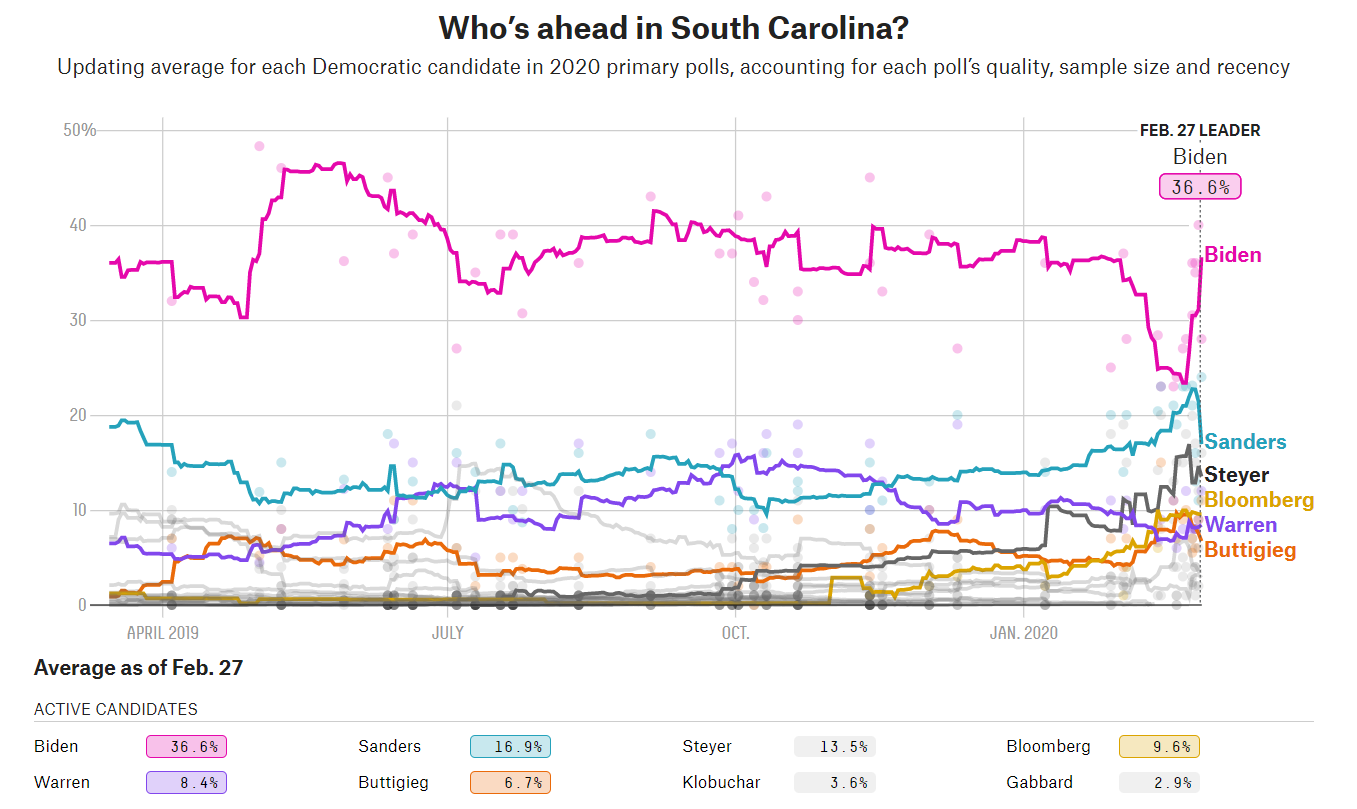
Brexit and the risks of economic nationalism

In talking about their future relationship with the UK, EU leaders may want to mind their language.
https://www.socialeurope.eu/brexit-and-the-risks-of-economic-nationalism
Though the British premier, Boris Johnson, says he ‘got Brexit done’ last month, the United Kingdom’s future economic relationship with the European Union remains undefined. Officials are ramping up to negotiate but reaching an agreement will be difficult. From a continental point of view, the UK is approaching the negotiations as if from another planet, as the chair of the European Parliament’s Brexit steering group, Guy Verhofstadt, has put it.
The negotiations present EU leaders with an under-appreciated, big-picture dilemma. At their heart will be the question of a ‘level playing field’. European officials say that the UK will have to adhere to the EU’s social, environmental, competition, and possibly even tax standards as a condition for broad and smooth access to the single market. But the British government completely rejects that demand. Its chief negotiator says ‘the point of the whole project’ is freedom for the UK to set its own (potentially lower) standards.
Nationalist thinking
The dilemma confronting the EU is that conditioning market access on UK agreement to this level playing field risks reinforcing nationalist economic thinking. And more such thinking is the last thing any EU leader, from the far left to the centre-right, wants to see. If too many more people come to believe that gains for other countries mean losses for their own, or that international markets force nations to race to the bottom on social standards, the European project—and even many other international economic institutions—will be in serious trouble. Nationalist instincts gave rise to the headache of Brexit in the first place, along with the victory in the United States of 2016’s other great free trade disruptor, Donald Trump.
The president’s approach to the renegotiation of his country’s North American Free Trade Agreement with Canada and Mexico is telling about the sort of ideas that lead to demands for a level playing field. Trump, an avowed nationalist, criticised NAFTA for years as an unfair deal on which the US was purportedly out-negotiated. Now he promotes his new, more protectionist US-Mexico-Canada Agreement as including ‘unprecedented labor standards that will help level the playing field for [American] workers’. Trump seems to believe that weak labour laws (at least hitherto) have been giving Mexico an advantage in a zero-sum competition with the US. This is strikingly similar to the advantage European officials are suggesting the UK could gain outside the EU—hence their demands that it not drop below European standards.
snip
Bloomberg advert claims he lead NYC through 9/11
Profile Information
Gender: FemaleHometown: London
Home country: US/UK/Sweden
Current location: Stockholm, Sweden
Member since: Sun Jul 1, 2018, 07:25 PM
Number of posts: 43,312